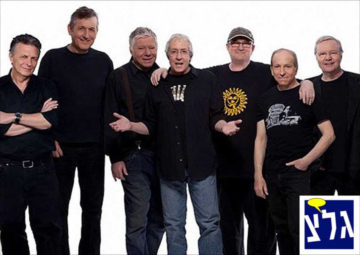INFORMATION
| Born In : | Israel |
“Poogy Stories” was the debut album of the Kaveret band, which underwent various incarnations before it became a group. Before recording the album, the band members and other participants recorded songs that were not part of an album. Many of these songs eventually found their way to the album, in the final composition of the band.
The album was based on the Poogy Tales that Sanderson recorded in 1972 along with his friends from the Nahal troupe, including Gidi Gov, Alon Olearchik and Efraim Shamir, who became members of the band, in addition to Miri Aloni, Menachem Zilberman, David Shaanan and Tami Azaria who were not part of it. In the end, Avraham Deshe (Pashanel), who signed the band and produced the album, demanded that the opera structure be dismantled in order to make the album more catchy.
Songs of the album
Most of the songs in the album were written and composed by Danny Sanderson, when other band members sometimes joined him with words or melodies. Sanderson and the band were also responsible for the musical production. The songs were mostly characterized by nonsense humor, word games and unrealistic stories. However, it included love songs and more serious subjects. The music in the album was inspired by the rock bands of the 1960s, especially the Beatles.
The song “We Did not Know What to Do” was taken from the “Foggy Opera.” The song “Baruch’s Boots” was taken from a work that preceded the opera, “The Child from Brazil”. “Yossi is What Sounds” is a piece of music that Sanderson composed as a guitar exercise that was designed to teach his Yehuda Nahal band member, Yehuda Adar, to play in his unique style (later Idar Hever Sanderson for the establishment of “Aunt”). A song called “The Cold Shoulder,” which Sanderson wrote together with Melissa Conel at the age of 15. The song was performed by the band “The Catacombs,” which they founded during Sanderson’s high school in the US The song ” Was at “Foggy Pigs” in Dori Ben-Ze’ev’s program on Army Radio, which was originally called “Foggy Electrocuted.” Alon Olearchik claimed that the melody was too beautiful to be wasted on a skit and wrote him new and serious words, deviations from the rest of the album, which is lighter in nature. The songs “Yu Ye” and “Bee buried,” for example, are based on double meaning in Hebrew proverbs and create word games that change their accepted meaning. The songs “Baruch’s Boots” and “The Grocer’s Song” were in fact a continuation of the operas that were not recorded in the album but were performed in performances.
The cover of the album, which was unusual for Israeli albums from the time, did not present the band members, and was painted by Itamar Newman, Sanderson’s friend.
Getting the album
The album was released at the end of 1973, immediately after the Yom Kippur War. Before the war, the songs “Self Service” and “Bee buried the dog” were not received from the album for success on the radio, and the humor of the band members was accepted as unusual and incomprehensible, but after that the album was successfully received both publicly and commercially. The lighthearted and humorous atmosphere of the album was welcomed by the Israeli public after the trauma of the war, and the band’s performances among reserve soldiers also achieved great success. The album became a hit and the album itself was sold for the first year in 70,000 copies. By the end of the 1980s, the record had sold more than 140,000 copies, making it one of the best-selling albums in the history of Israeli music.
On the radio, the songs were also very popular, including “Baruch’s Boots” (which won the title of the song of the year by Kol Israel and Galatz the same year), “The Grocery Song” (third place in the 1973 Army parade), ” Here the dog is buried “(16th place in the same parade),” Yu Ya “, and more. Following the success of the album and the performances, Kaveret won the title “Band of the Year” by Kol Yisrael.
After the release of the album
A year after the release of the album, the band released the album “Foggy Pita” which also included songs from the early rock operas and achieved great success in the audience.
In 1989 the album was released on CD. In honor of the renewed publication, Hed Artzi has added five new tracks to the album, which were not included in its original publication. Among other things, the band included the performance of the classic song “Iwo Nights,” from a rehearsal in 1973, and humorous sketches such as “Mathematics” and “Piano Lesson” recorded by Sanderson, Gov and Fenigstein in 1971 to “Foggy” .
In 2013, 40 years since the release of the album, the band reunited for the fourth time since its dissolution in 1976. On the occasion of the reunion, Army Radio held a tribute to the album, in which young bands such as Mercedes Band, Ice Nine and others performed the album’s songs. Published by Army Radio the following year.

